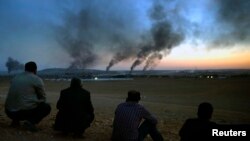Syrian activists said more than 800 people have been killed in ground fighting in Kobani in the six-week battle between Islamic State militants and Kurdish fighters for control of the Syrian town just south of the Turkish border.
The British-based Syrian Observatory for Human Rights said Sunday that nearly 500 jihadists and more than 300 Kurds have been killed. That total is in addition to another 550 or more killed by U.S.-led airstrikes in the last month, most of them Islamic State fighters.
Meanwhile, a spokesman for Iraqi Kurdish forces said they will not engage in ground fighting in the Syrian town of Kobani but provide artillery support for fellow Kurds fending off Islamic State militants there.
Islamic State fighters have been trying to capture Kobani for over a month, pressing on despite U.S.-led airstrikes on their positions and the deaths of hundreds of their fighters.
The Kurdish region's parliament voted last week to deploy some of its peshmerga forces, which have been fighting their own battle against Islamic State militants in northern Iraq, to Syria.
“Primarily, it will be a back-up support with artillery and other weapons,” Kurdistan Regional Government (KRG) spokesman Safeen Dizayee told Reuters. “It will not be combat troops as such, at this point anyway.”
US, coalition airstrikes
Also Sunday, U.S. military forces conducted five airstrikes against Islamic State targets near Kobani, and with the help of partner nations another 12 separate strikes in Iraq, the U.S. Central Command said.
In Iraq nine airstrikes were made around the strategic Mosul dam and three airstrikes southeast of Fallujah.
“Among the coalition nations conducting airstrikes in Iraq are the U.S., France, United Kingdom, Australia, Belgium, Denmark and the Netherlands. Coalition nations conducting airstrikes in Syria include the U.S., Saudi Arabia, United Arab Emirates, Jordan, and Bahrain,” Central Command said.
At Kobani, the rights group said 21 civilians have been killed during the ground fight, but most of Kobani's population has fled to refugee camps in Turkey, with more than 200,000 streaming across the border.
The jihadists tried for the fourth straight day to seize a border crossing from Turkey into Syria but were thwarted by the Kurdish fighters.
The location is a key passage as Iraqi Kurds prepare to send 200 well-trained peshmerga fighters through Turkey and into the battle for Kobani.
Some of those new fighters could head to Kobani as early as this week.
Peshmerga forces
In a separate interview with Reuters on Sunday, the chief of staff to the president of Iraqi Kurdistan, said the peshmerga were ready to depart as soon as a timetable had been finalized with Ankara and Kurds in Syria.
Fuad Hussein said he expected the 155 peshmerga fighters to move “one of these days."
Asked about the weapons the peshmerga would take, Hussein described them as “semi-heavy” and said they would enable the lightly armed Kurdish fighters in Kobani to counter Islamic State fighters' tanks and armored vehicles.
The battle for Kobani has taken on major political significance for Turkey, whose own Kurds have been infuriated by Ankara's reluctance to intervene, threatening to derail a peace process between the government and separatist guerrillas.
Meanwhile, Iraq says its forces, backed by Shi'ite militiamen, have recaptured the town of Jurf al-Sakhar, 50 kilometers south of the capital, Baghdad. Jurf al-Sakhar had fallen to Islamic State fighters in July.
Iraqi Prime Minister Haider al-Abadi is calling the recapture of the town a "fatal blow" against the Islamic State group.
Iraqi security sources said Kurdish militia fighters retook the northern town of Zumar and several surrounding villages from Islamic State fighters.
Some material for this report came from Reuters.












